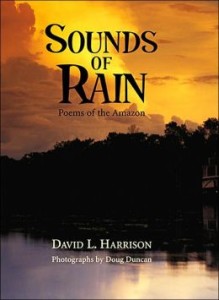Ambassadors
 Upstream the jungle hovers,
Upstream the jungle hovers,
leans in from either side,
hides secrets behind vines,
three huts perch
along a strip of clay.
Men stand still as trunks,
size us up as hunters do.
Mothers pause, smile a little,
a courtesy to strangers on the river.
Children laughing with their eyes
run the bank naked or not
good will grinning across the water.
They wave and we wave back
until we turn the bend,
carrying away the memory.
Copyright © 2006 David L. Harrison. From the book Sounds of Rain: Poems of the Amazon. Wordsong. Reprinted by permission of the author.
About this Poem
We left the Amazon and kept pushing further upstream on smaller tributaries deeper into the Peruvian rain forest. At night occasional lights from huts along the stream flickered like fireflies through the trees. By day we passed silent native people as curious about us as we were of them.
If I were in school and teacher said to write about what I did this summer, Sounds of Rain would be what I did in the summer of 2003. We took a trip and I brought back 90 pages of notes and hundreds of pictures. You don’t have to go to Peru. A trip to your own back yard is worth writing about!
About The Author
 David L. Harrison has published eighty-nine books of poetry, fiction, and nonfiction for young readers and educational books for teachers. He is poet laureate of Drury University and David Harrison Elementary School is named for him. His work has been anthologized in more than 120 books, translated into twelve languages, sandblasted in a library sidewalk, painted on a bookmobile, and presented on television, radio, podcast, and video stream. Let’s Write This Week with David Harrison is a 20-episode video program that brings writing tips into elementary classrooms and offers graduate college credit for teachers. David holds degrees from Drury and Emory universities. Two universities have presented him with honorary doctorates of letters. His poetry collection, Pirates, represented Missouri at the 2013 National Book Fair in Washington, D.C.
David L. Harrison has published eighty-nine books of poetry, fiction, and nonfiction for young readers and educational books for teachers. He is poet laureate of Drury University and David Harrison Elementary School is named for him. His work has been anthologized in more than 120 books, translated into twelve languages, sandblasted in a library sidewalk, painted on a bookmobile, and presented on television, radio, podcast, and video stream. Let’s Write This Week with David Harrison is a 20-episode video program that brings writing tips into elementary classrooms and offers graduate college credit for teachers. David holds degrees from Drury and Emory universities. Two universities have presented him with honorary doctorates of letters. His poetry collection, Pirates, represented Missouri at the 2013 National Book Fair in Washington, D.C.






Your poem moved slowly, just like the boat, David. Wonderful memory kept here! It reminds me of driving through a remote area in Mexico, children running out to wave!
Thank you, Linda. I’m glad you like the poem. It brings back lots of memories.
Love this poem, David–I especially love how you set the scene in nature and then move on to people. And the interaction–but not quite–between you and the people on the banks. I think the whole world feels like that to some kids. Like everybody else is this vast distance away. Across some unswimmable water. And those people are just as mysterious–maybe friendly, maybe not.
Thank you so much, Laura. To me the poem is a metaphor for how close we can be physically yet remain distant from those we don’t now. The kids are the only ones who don’t yet have masks to wear.
Wonderful poem, David! This is a great example to show writers (even kids) how to show, not tell. You never once say how anyone is feeling, what’s going through people’s minds, etc. – yet the reader understands exactly what emotions are on display here. Well done!
Hi, Matt. Thanks so much. Showing is nearly always better than telling but it doesn’t always work out. I think it did in this poem.
Kenn, thank you for including me on your marvelous poetry site. I hope that by now this welcoming place has been discovered by teachers, parents, kids, and other poets across the country and around the world.